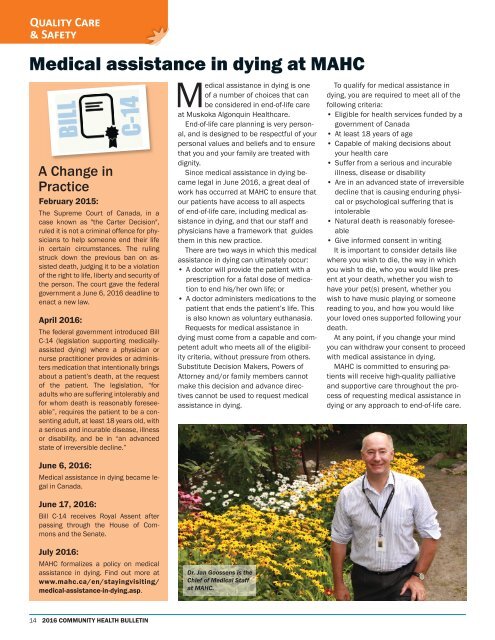MAHC-Community-Health-Bulletin-Final
Create successful ePaper yourself
Turn your PDF publications into a flip-book with our unique Google optimized e-Paper software.
Qu Ce<br />
Se<br />
Medical assistance in dying at <strong>MAHC</strong><br />
A Change in<br />
Practice<br />
February 2015:<br />
The Supreme Court of Canada, in a<br />
case known as "the Carter Decision",<br />
ruled it is not a criminal offence for physicians<br />
to help someone end their life<br />
in certain circumstances. The ruling<br />
struck down the previous ban on assisted<br />
death, judging it to be a violation<br />
of the right to life, liberty and security of<br />
the person. The court gave the federal<br />
government a June 6, 2016 deadline to<br />
enact a new law.<br />
April 2016:<br />
The federal government introduced Bill<br />
C-14 (legislation supporting medicallyassisted<br />
dying) where a physician or<br />
nurse practitioner provides or administers<br />
medication that intentionally brings<br />
about a patient’s death, at the request<br />
of the patient. The legislation, “for<br />
adults who are suffering intolerably and<br />
for whom death is reasonably foreseeable”,<br />
requires the patient to be a consenting<br />
adult, at least 18 years old, with<br />
a serious and incurable disease, illness<br />
or disability, and be in “an advanced<br />
state of irreversible decline.”<br />
June 6, 2016:<br />
Medical assistance in dying became legal<br />
in Canada.<br />
June 17, 2016:<br />
Bill C-14 receives Royal Assent after<br />
passing through the House of Commons<br />
and the Senate.<br />
Medical assistance in dying is one<br />
of a number of choices that can<br />
be considered in end-of-life care<br />
at Muskoka Algonquin <strong>Health</strong>care.<br />
End-of-life care planning is very personal,<br />
and is designed to be respectful of your<br />
personal values and beliefs and to ensure<br />
that you and your family are treated with<br />
dignity.<br />
Since medical assistance in dying became<br />
legal in June 2016, a great deal of<br />
work has occurred at <strong>MAHC</strong> to ensure that<br />
our patients have access to all aspects<br />
of end-of-life care, including medical assistance<br />
in dying, and that our staff and<br />
physicians have a framework that guides<br />
them in this new practice.<br />
There are two ways in which this medical<br />
assistance in dying can ultimately occur:<br />
• A doctor will provide the patient with a<br />
prescription for a fatal dose of medication<br />
to end his/her own life; or<br />
• A doctor administers medications to the<br />
patient that ends the patient’s life. This<br />
is also known as voluntary euthanasia.<br />
Requests for medical assistance in<br />
dying must come from a capable and competent<br />
adult who meets all of the eligibility<br />
criteria, without pressure from others.<br />
Substitute Decision Makers, Powers of<br />
Attorney and/or family members cannot<br />
make this decision and advance directives<br />
cannot be used to request medical<br />
assistance in dying.<br />
To qualify for medical assistance in<br />
dying, you are required to meet all of the<br />
following criteria:<br />
• Eligible for health services funded by a<br />
government of Canada<br />
• At least 18 years of age<br />
• Capable of making decisions about<br />
your health care<br />
• Suffer from a serious and incurable<br />
illness, disease or disability<br />
• Are in an advanced state of irreversible<br />
decline that is causing enduring physical<br />
or psychological suffering that is<br />
intolerable<br />
• Natural death is reasonably foreseeable<br />
• Give informed consent in writing<br />
It is important to consider details like<br />
where you wish to die, the way in which<br />
you wish to die, who you would like present<br />
at your death, whether you wish to<br />
have your pet(s) present, whether you<br />
wish to have music playing or someone<br />
reading to you, and how you would like<br />
your loved ones supported following your<br />
death.<br />
At any point, if you change your mind<br />
you can withdraw your consent to proceed<br />
with medical assistance in dying.<br />
<strong>MAHC</strong> is committed to ensuring patients<br />
will receive high-quality palliative<br />
and supportive care throughout the process<br />
of requesting medical assistance in<br />
dying or any approach to end-of-life care.<br />
July 2016:<br />
<strong>MAHC</strong> formalizes a policy on medical<br />
assistance in dying. Find out more at<br />
www.mahc.ca/en/stayingvisiting/<br />
medical-assistance-in-dying.asp.<br />
Dr. Jan Goossens is the<br />
Chief of Medical Staff<br />
at <strong>MAHC</strong>.<br />
14 2016 COMMUNITY HEALTH BULLETIN


